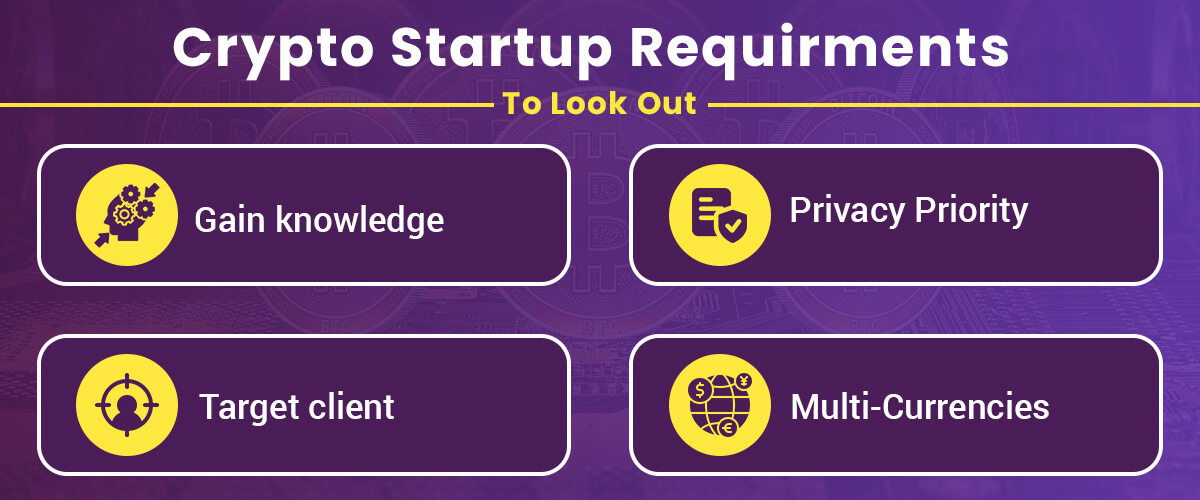
Cryptocurrency has been a new-age business horizon that engages individuals, mid-sized companies, and large-scale enterprises. User penetration in the cryptocurrency market is continuously increasing and is expected to hit 12.39%, a whopping 992.50 million users by 2028. The increase in the global user base of cryptocurrencies is projected to uplift the revenue in the cryptocurrency market to $51.5 billion in 2024 and $71.7 billion by 2028 at a CAGR of 8.62%.
If you are a farsighted entrepreneur and want to venture into a digital business that offers lucrative returns, statistics indicate that cryptocurrency is the best business to start. The crypto market outlook forecast ensures that start-ups have better opportunity to capitalize.
What’s next? Suppose you think the crypto business is creating, exchanging, and charging brokerage various digital currencies. In that case, you need to look around the sweltering trend of the latest crypto business from a start-up’s viewpoint. Crypto business could be from any industry vertical! For instance, Shopify, MasterCard, QuickBooks, and Visa use cryptocurrencies to make purchases more effortless.
By looking at the potential growth in the crypto market, its increasing usage by the users, and worldwide adoption by businesses from all industry verticals, the new avatar of digital transactions (Cryptocurrency) has a competitive advantage over other forms due to its ample features.
It brought start-up enthusiasts on their tips and toes to start a cryptocurrency business. Technical solutions built by cryptocurrency development companies for crypto businesses enable start-ups work using niche digital products. In addition to crypto solutions, entrepreneurs need ideas and must know about crypto business benefits and processes to start the crypto business optimally, which are explained with attention to detail. Let’s dive in!
Table of Contents
What is a Crypto Business?
A crypto business refers to any enterprise that leverages blockchain technology and cryptocurrencies to offer products or services. These businesses operate within the digital economy, facilitating secure, decentralized, and transparent interactions through smart contracts, tokens, and distributed ledgers.
Crypto businesses can range from startups developing cryptocurrency wallets to large-scale platforms managing digital asset exchanges or decentralized finance (DeFi) ecosystems. Some focus on building custom cryptocurrencies or tokens that serve specific use cases, while others enable blockchain integration for supply chains, identity systems, or payment networks.
At their core, these businesses eliminate the need for central authorities in transactions by automating trust and verification through code. With applications spanning finance, gaming, healthcare, and logistics, crypto businesses are reshaping the global digital infrastructure.
By combining innovation, security, and decentralization, crypto businesses create value for users, investors, and institutions in ways that traditional models cannot. The growing adoption of bitcoin, Ethereum, and other digital assets continues to push these ventures into the mainstream economy.
Types of Crypto Businesses You Can Launch
The versatility of blockchain allows entrepreneurs to build diverse crypto-driven solutions, tailored to specific needs and market gaps. Here are some of the most promising types of crypto businesses you can launch:
Cryptocurrency Exchange Platforms
These platforms allow users to trade digital assets like bitcoin, Ethereum, and stablecoins. You can launch either:
- A Centralized Exchange (CEX) that offers fast transactions, liquidity, and traditional controls
- A Decentralized Exchange (DEX) that enables peer-to-peer trading without intermediaries using automated smart contracts
Crypto Wallet Development
Digital wallets are essential for storing, sending, and receiving cryptocurrencies. You can build:
- Custodial wallets where user funds are managed centrally
- Non-custodial wallets that give users full control over private keys
Advanced features like multi-signature authentication, seed phrase recovery, and NFT support add more value.
DeFi Platforms
Decentralized Finance (DeFi) services allow users to lend, borrow, stake, and earn yields directly from smart contracts. You can develop DeFi solutions such as:
- Lending and borrowing protocols
- Liquidity pools and yield farming platforms
- Stablecoin issuance and synthetic asset systems
NFT Marketplaces
You can create platforms that enable the minting, buying, and selling of non-fungible tokens (NFTs), covering art, music, collectibles, or real estate. These platforms can include auction systems, metadata management, and royalty tracking.
Token or Coin Creation Services
Launching a utility token, governance token, or native cryptocurrency helps businesses create internal economies or fundraising mechanisms like ICO, STO, or IEO. Many startups also tokenize assets for fractional ownership or supply chain tracking.
Blockchain Consulting and Infrastructure Solutions
Companies with blockchain expertise can offer services to enterprises seeking integration or development. Services may include:
- Building private blockchains
- Creating smart contracts
- Performing security audits
- Regulatory consultation
Each business model serves a specific audience—from crypto enthusiasts and traders to enterprises and government bodies. The right choice depends on your technical capabilities, funding, and target market.
Key Steps to Start a Crypto Business
Valiant efforts by startups are aimed at getting assured growth with minimal complexity. The crypto business has significant advantages for new entrepreneurs. The technology offers a lot of pros for anyone who is techno-savvy and wants to grow in the digital tech domain.
Easy Transaction
Crypto technology offers ease in transactions i.e. it transfers funds from purchasers to your business account without any banks or cards. The upshot of such transactions is that clients find it quite convenient and money-saving (as they don’t have to pay hefty fees or charges for any transactions or services)
Wider reach
It has to be noted that digital currencies have more comprehensive access and reach. In the past couple of years, thousands of companies and now even some countries have made digital currency legal for trade within their territories and service domains. Cryptocurrency has no geo-boundaries and is free from any credit. Hence, for an entrepreneur, this could be an ideal global startup.
Unmatched security
The translucent bet that new startups or enterprises have on crypto business is the security and limpidness it offers. Blockchain technology offers a unique database that stores information in strata of innumerable blocks connected to each other. Each new datum would have a new block, and that block again becomes part of an infinite chain, making it impossible to track and hack. A single bit of information could be easily breached or peeped into, but cryptocurrencies based on blockchain technology are diversified and highly secure.
Decentralized
Governments have little hold over cryptocurrencies, which make them decentralized. Most digital currencies’ values don’t fall under any national policies; in fact, some governments have or are thinking of having their own crypto. However, cryptocurrencies do fall under properties watched by the federal government; hence, it is a taxable income though not typically like the US dollar.
Crypto wave
The biggest benefit new enterprise or startup has is that cryptocurrencies are becoming a touchstone of contemporary trading based on which other trading technologies are getting developed; hence, the more startups get into the crypto business, the more it becomes popular. Again, more popularity would make crypto even more adaptable, which ultimately means that the business will skyrocket. A lot of established companies are educating people about cryptocurrencies. Entrepreneurs, too, can jump on the bandwagon.
Top Ideas to Start Your Crypto Business
Crypto businesses come in many forms and it is important for a businessperson to decide on which one is suitable to their budget and expertise. While you must check crypto business ideas as a whole, it is important to ponder over a few technical and managerial concerns before deciding and kicking off your crypto business venture.
- Starting a Crypto Tax Business
- Buying, Selling, and Trading Online Advertising Space
- Starting a Crypto Hardware Business
- Play to Earn Games
- Starting a Crypto Consulting Business
- Creating a Crypto NFT Business
- Crypto Accounting Business
- Decentralized Cloud Storage
- Crypto Mining Business
- Building a Crypto App
- Lending Crypto
- Crypto Payment Gateway
- Starting a Cryptocurrency Exchange
- Crypto wallet development
- Create dApps
- Cryptocurrency ATM
- DeFi aggregators
- Decentralized cloud storage
- Bitcoin escrow development
- Blockchain development company
- Crypto MLM
- Crypto vending machine
- Cybersecurity system
- Digital asset management
- Crypto loans
- Crypto Crowdfunding
- Crypto mining business
- Token
- Crypto consulting
- Crypto marketing
Factors To Consider When Starting Your Crypto Business
As with any other startup or new enterprise, intense market research and calculated strategies are the primary steps to kick-start a crypto business. Here are a few factors to consider.
Gain knowledge
From costs to risks, cryptocurrencies are to be studied thoroughly. Tax regulation has been one of the most complex matters for entrepreneurs, and crypto won’t be spared. In fact, the rules would be much more complex when countries customize the rules as per their national interests. Businesses that adopt cryptocurrencies as legal tender will have to undergo licensing and registration of all kinds; hence, special legal counseling will be mandatory. Enterprises or startups in the crypto business shall have domain expertise before getting into it.
Target client
People interested in dealing with cryptocurrencies are premium. Luxury clients interested in newer technology for smooth financial transactions or trading are targeted in the crypto business. On the other hand, big companies are also interested in crypto transactions; say, in March 2021, Tesla declared that they would accept Bitcoin for Tesla car purchases. The company backed out later, but that didn’t restrict other companies from accepting digital currencies.
Privacy priority
Customers use crypto wallets to make transactions. Make sure that your crypto business gives priority to privacy. It would help if you took extra precautions to make your business a safe portal to deal with. Confidentiality is what the present buyers look forward to.
Multi-currencies
Around 6,000 cryptocurrencies exist in the market, and it is growing every day. Since digital money is a new concept, there are chances of prevalent opportunities for skullduggery. Hence, you need to ensure that you adopt more than one currency for your business, but the genuine one.
A farsighted entrepreneur looks forward to going beyond ossified trading methods and adapting crypto transactions. Thus, your startup business, or let’s call it a crypto enterprise, requires professional software development companies that take care of security and abide by local body regulations. Outsourcing the project to an offshore IT company helps you build crypto solutions without compromising on product quality. Alternatively, you can hire freelancers to build a crypto app or website, but you should go through an authentic agency.
Cost to Start a Crypto Business
The cost of launching a crypto business varies greatly depending on the type of platform, development approach, and business goals. It’s important to consider not only the initial development costs but also ongoing operational expenses such as legal compliance, marketing, and infrastructure.
Here’s a closer look at the factors that influence cost:
Type of Crypto Business
Token Development: A simple ERC-20 or BEP-20 token can cost between $5,000 and $15,000, including smart contract deployment and testing.
Crypto Wallet App: Developing a secure, feature-rich wallet may cost between $10,000 to $30,000, depending on platform support (iOS, Android, Web) and integrations.
Crypto Exchange: A full-featured exchange, especially a centralized one with KYC, multi-currency support, and liquidity APIs, may require $50,000 to $150,000+.
DeFi Platform or NFT Marketplace: These complex platforms involve smart contract logic, front-end development, and thorough security testing. Costs can range from $40,000 to $100,000+.
Crypto Development Model
- Custom crypto development offers full control but is more expensive and time-consuming.
- White-label Solutions reduce cost and time-to-market but may offer limited flexibility.
Technology Stack
The choice of blockchain (e.g., Ethereum, Polygon, Solana), security tools, programming languages, cloud infrastructure, and third-party integrations all impact pricing.
Regulatory & Legal Compliance
Securing licenses like MSB (Money Services Business) registration in the U.S. or adhering to MiCA compliance in Europe adds legal costs that can range from $5,000 to $25,000+ depending on the region.
Maintenance and Upgrades
Post-launch support, smart contract audits, and user feedback loops require a long-term budget plan for scaling and improvements.
A realistic budget should account for development, legal, design, marketing, server hosting, and ongoing security. Choosing an experienced cryptocurrency development company can help optimize costs while delivering a secure and scalable solution.
Ready to Start your own Crypto business?
Since now you have an overall idea of starting a crypto business, the time is to initiate building a roadmap and prospects for the cryptocurrency business. It is worth noting that you need to strategize crypto business applications by taking several factors into account such as local and international regulations, digital compliances, and the like.
Rebecca Harrison combines her love for emerging technologies with her ability to explain them in clear, concise terms. With expertise in blockchain, IoT, cloud computing, big data, and cryptocurrency, Rebecca’s articles are essential reads for tech-savvy audiences. She has worked closely with tech startups and established companies to explore the potential of these transformative technologies.



